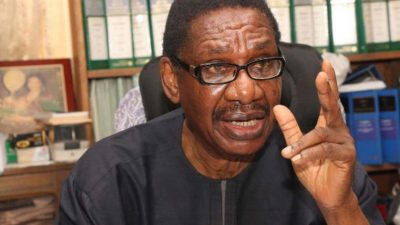
Prof. Itse Sagay (SAN), Chairman of the Presidential Advisory Committee Against Corruption (PACAC), on Monday said the debate by lawmakers in the National Assembly that Nigeria should return to a parliamentary system of government is a wasteful diversion of time and resources.
He also described the proponents as ignorant people who really do not know what they are wishing for.
In a statement titled: “Proponents of the parliamentary system: Beware of your wishes,” Sagay said those with the belief that the system will result in a weak Executive branch should have a rethink because unknown to them, they are asking for a system in which a powerful Prime Minister will control both the Legislative and the Executive Arms of government.
Describing the lawmakers as unemployed, Sagay argued that the plot is targeted at President Muhammadu Buhari, adding that the lawmakers think they can weaken his powers. He said it is foolish for them to reason in that manner.
While sounding a note of warning to the lawmakers, Sagay said what Nigeria needs is responsible leaders who can pilot the affairs of the country, adding that there is no difference between the presidential and parliamentary system of government.
“Once again, Nigerians (this time unemployed legislators) have found a new favourite subject for debate and wasteful diversion of time and resources. Suddenly, parliamentary system of government is the Holy Grail for Nigerian political salvation. For days now, the media, both orthodox and social, have become fiercely engaged in pursuing a new political chimera with excitement and apparent seriousness”.
“Let it be made clear, the whole idea of one system being better than the other is “poppy cock”, time wasting, arising from either ignorance or mischief. The mischief here being to have a Buhari with reduced powers”.
Going down memory lane, Sagay said: “In 1963, when I was an undergraduate at the University of Ife, the students’ union invited Chief Rotimi Williams, soon after he left office as Attorney-General of the Western Region, to address the students’ body on which system was preferable for Nigeria: Parliamentary or Presidential? I have never forgotten his answer. Briefly summarized, it was that neither of the two systems was better than the other”.
“The success of governance depended on the quality of the operators of government. Bad operators, that is, bad politicians and “leaders” would always produce bad and failed governance. In other words, the fault was not in the system of governance, but in the quality of the operators of the system”.
“We were operating this suddenly “golden” parliamentary system then. It led to a declaration of a state of emergency in the Western Region, restriction and detention of major political figures, crisis and violence, and the fall of the First Republic. The fault dear Nigerians, was not in that system, but in the irresponsible and reckless manner in which First Republic politicians conducted themselves.
“It is even more foolish to think that the introduction of the parliamentary system will weaken the Buhari government and empower the opposition. On the contrary, the Prime Minister under a Parliamentary System is far more powerful than a President under the Presidential system.
“The Prime Minister combines the positions of Leader of Parliament and Head of Government. He does not need the confirmation of parliament to appoint ministers. It is his sole prerogative. If a vote of no confidence against him succeeds, he can dissolve parliament, and compel his critics and foes to face a fresh election in which they might not be returned”.
“In other words, a Prime Minister is President and Speaker of the House of Representatives rolled into one. Never mind the fact that the British Parliament has someone designated “Speaker”. All he does is to recognize House members who wish to speak”.
“The Prime Minister must be recognized above every other person as soon as he or she rises up to speak. The Speaker has no discretion in that regard. It is the British Prime Minister who exercises all the powers currently enjoyed by the Nigerian speaker. The House of Lords (Senate) is simply a decoration intended to give the aristocracy and retired elder statesmen a false sense of importance and relevance”.
“The Prime Minister is effectively, National President, Speaker and President of the Senate, rolled into one. To bring home the message clearly, there will be no “Saraki”, no “Dogara”- in that system. Buhari will bestride the Nigerian World, under the parliamentary system being proposed”.
“The Senate and its President in such a system is an impotent and relatively unimportant body. It can delay, but cannot hold-up legislation. In fact, its opposition to any bill can be overridden by the House under the leadership of the Prime Minister”.
“So those calling for the re-introduction of the parliamentary system in the mistaken belief that it will result in a weak Executive branch should think again. They are foolishly asking for a system in which a powerful Prime Minister will control both the Legislative and the Executive Arms of government. My advice to them is: “Beware of what you wish for yourselves”.

